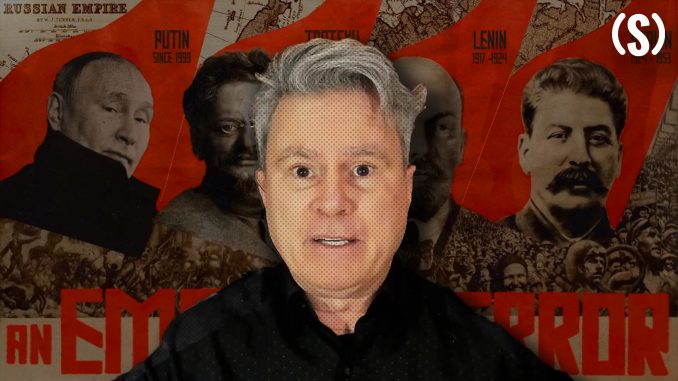
Historian and commentator Bill Whittle sat down recently with The Daily Signal to discuss the latest season of “What We Saw,” a critically acclaimed documentary series from The Daily Wire.
In the new season, called “Empire of Terror,” Whittle picks apart the largely unknown history of the rise of the Soviet Union and how it translates to today. He unearths critical pieces of information that shatter any case for communism.
Although many claim that Vladimir Lenin’s vision for communism was pure, a will of the people that was only corrupted later by Josef Stalin’s ruthless regime, Whittle illustrates a severely different picture.
“I didn’t finish with Lenin until the end of episode six—it’s hardly about Stalin at all, and the reason is because [the Soviets’ empire of terror] is not Stalin’s creation. It’s Lenin’s creation,” he said, adding:
Lenin wrote the manual and Stalin followed the instructions. The defenders of communism would like to say that Lenin had created this ‘workers’ paradise,’ died of an early stroke, and this monster Stalin came in and ruined everything. Their argument is that [the Soviets] just didn’t do [communism] right.
Look what communism did in the Soviet Union, killed 20 million people. [Soviet communists] didn’t do it the wrong way, and they didn’t do it the right way. They did it the only way.
Lenin created a state where the only person who could succeed him would be the most ruthless murderer in the bunch.
Whittle’s masterful outline doesn’t end in the 1940s, where season two of “What We Saw” picks up at the end of World War II.
He connects crucially important historical data and family trees to the leaders and attitudes on today’s world stage, including Russian President Vladimir Putin and modern cancel culture in the West.
Putin’s grandfather was Spiridon Putin, the personal cook much beloved by Lenin and Stalin, whose inspiration pushed a young Vladimir to attempt enlisting with the Soviets before he turned 18.
“You’ve got to think about what kind of stories young Vladimir must have heard on the knee of his grandfather talking about the Soviet Union,” Whittle said.
“It must have been effective, because then Putin went on to become a KGB agent in Dresden of all places,” I agreed in our exchange.
Whittle and I discussed the change in dark Russian humor over the 20th century, ultimately aiding in the USSR’s downfall, and connected the demonization of laughter and mirth to cancel culture in modern Western societies.
“We’re seeing so many of the same mechanisms that governed the Soviet Union being employed in the United States,” Whittle said, adding:
I didn’t say the outcomes, I said the mechanisms. The refusal to hear a differing opinion, just the absolute silencing of critics, the shaming and the destruction of people who are against the official opinion of whatever that might happen to be. And especially, most especially, the one thing that these systems require; the communists required it, the Nazis required it, and the progressives require it.
They require an enemy who is responsible for their own failures.
In an era of uncertainty when the authoritarian mechanisms from the age of fascism and communism again are rearing their ugly heads, Whittle’s outline of the rise of the Soviet Union’s “Empire of Terror” is an essential piece of historical commentary to recognize the elements of danger and the keys to their defeat.
